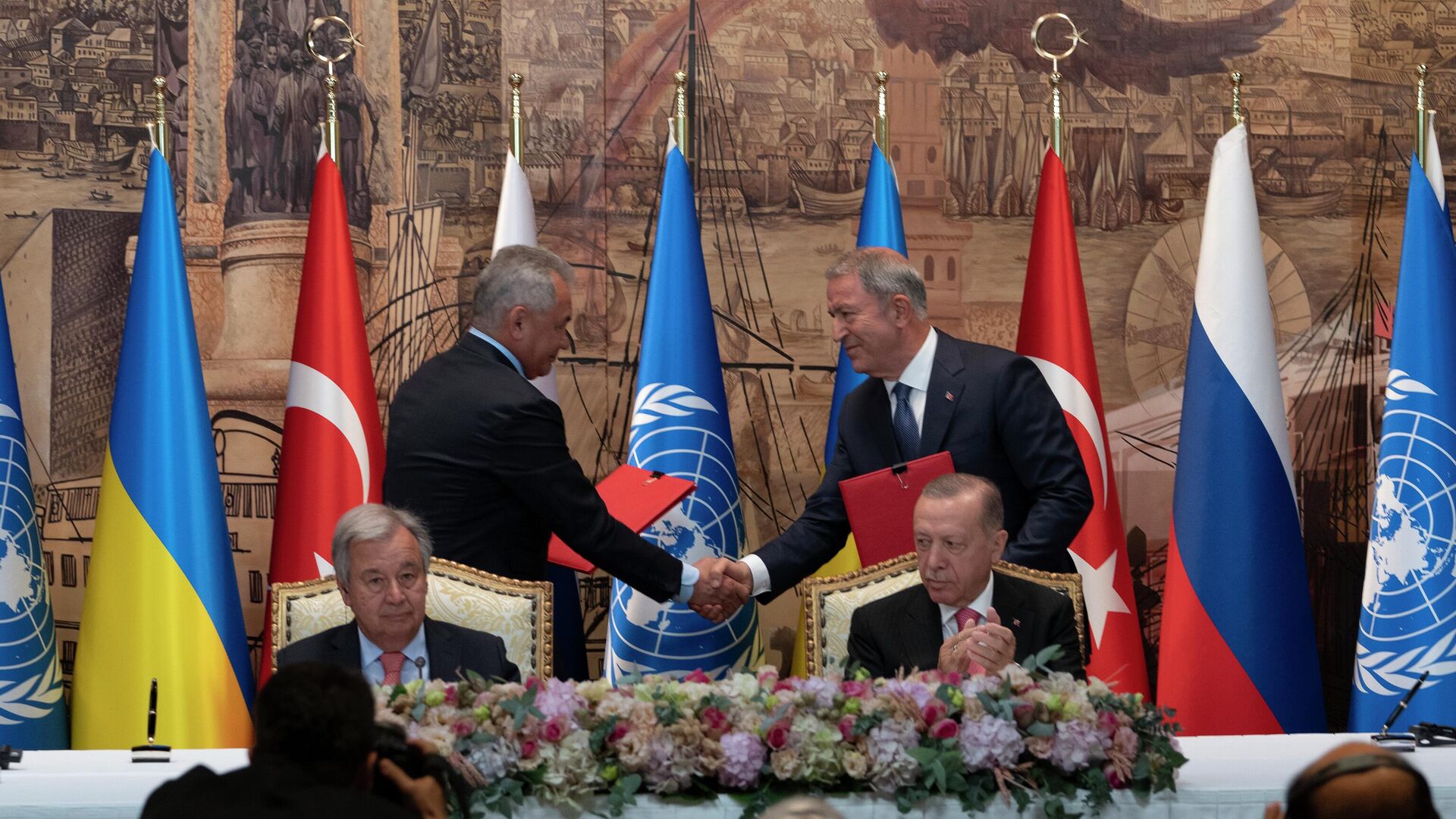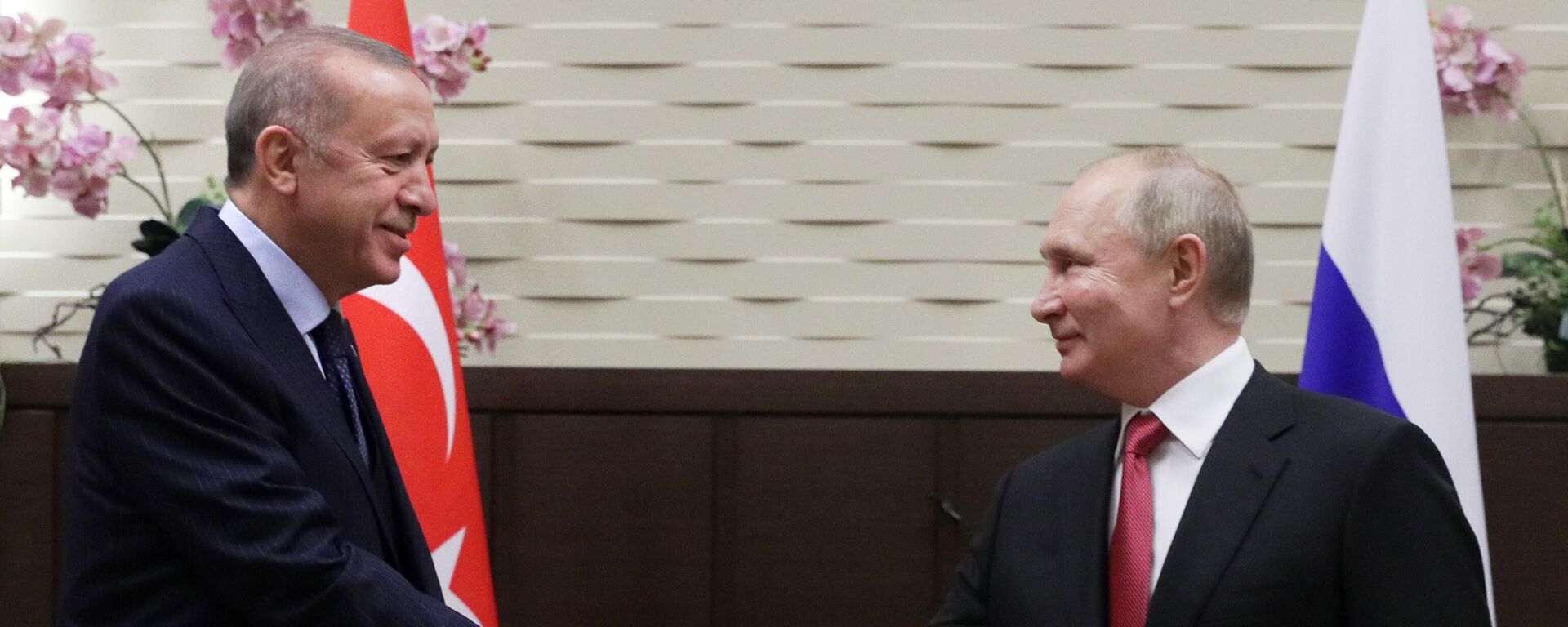Russia, Ukraine Sign UN-Mediated Grain Deal in Istanbul
14:21 GMT 22.07.2022 (Updated: 11:37 GMT 17.07.2023)

© AP Photo / Khalil Hamra
Subscribe
UNITED NATIONS (Sputnik) - Russian Defense Minister Sergei Shoigu, Turkish Defense Minister Hulusi Akar and Ukrainian Infrastructure Minister Oleksandr Kubrakov signed a UN-brokered grain deal in Istanbul on Friday.
Russian Defense Minister Sergey Shoigu said that two documents were signed in Istanbul aimed at solving the issue of food and grain exports to the global market.
"Today in Istanbul, two documents were signed aimed at solving the problems of supplying food and fertilizers to world markets. I want to emphasize that these documents are interconnected and represent a single package," Shoigu said at a ceremony held after the deal was signed.
The defense minister added that the first document stipulates the United Nations to facilitate removal of restrictions on exports of Russian agricultural products.
"The second document defines the algorithm for the export of Ukrainian agricultural products from the Black Sea ports controlled by Ukraine," Shoigu said, adding that Kiev is responsible for security in Ukrainian territorial waters, including demining.
In addition, the minister said that the deal would be impossible without active mediating role of Turkey and the UN. Shoigu promised that Russia will not take advantage of demining and opening of Ukrainian ports.
"The second document defines the algorithm for the export of Ukrainian agricultural products from the Black Sea ports controlled by Ukraine," Shoigu said, adding that Kiev is responsible for security in Ukrainian territorial waters, including demining.
In addition, the minister said that the deal would be impossible without active mediating role of Turkey and the UN. Shoigu promised that Russia will not take advantage of demining and opening of Ukrainian ports.
Commenting on the signed memorandum, a UN official explained that the Black Sea grain initiative is a renewable 120-day deal, but it should continue until the Russia-Ukraine conflict ends. The official added that it will take weeks to see ships transport grain in the Black Sea.
"We were told earlier on in the negotiation by the Ukrainian side that they need about 10 days to prepare the ports to be ready to start moving again. So I think we're talking about, you know, a few weeks before we will see proper implementation of vessels going in and out," the official added.
Inspection teams under control of the Joint Coordination Center will make sure that vessels heading to Ukraine are not used to ship weapons to Ukraine, he said.
"There will be ships monitored across the Black Sea ... there will be an inspection of ships going in these ports ... The UN inspection team will be set up. The ships will be inspected making sure that there will be no weapons going into Ukraine," the UN official told briefing.
"There will be ships monitored across the Black Sea ... there will be an inspection of ships going in these ports ... The UN inspection team will be set up. The ships will be inspected making sure that there will be no weapons going into Ukraine," the UN official told briefing.
The export of Ukraine grain, foodstuff, fertilizer [will be conduced] across from the three ports, Odessa and two related ports," the UN official said.
Russia and Ukraine have agreed to ensure a safe passage of vessels shipping grain in the Black Sea and abstain from attacking them.
"Both parties ... have agreed that, there should be no attacks on any of the vessels going from those ports out of territorial waters into the Black Sea and out by any party. So there will be a safe passage," the UN official said.
Grain supplies from Ukraine ceased earlier this year amid Russia's special military operation in the country, raising concerns about acute food shortages across the globe. The West has been blaming Russia for blocking shipments of grain, sunflower and fertilizers from Ukraine. Moscow has repeatedly denied the accusations, noting that the crisis was provoked by Ukrainian forces, who had mined the Black Sea ports. The Kremlin also stressed that Western sanctions against Russian agricultural exports have contributed to the issue.

